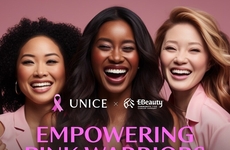
Unilever Helps Black Groups Fight Hair Discrimination
Grace Mahas — February 1, 2021 — Social Good
References: www2.fundsforngos.org & theguardian
Unilever, the British multinational consumer goods company, recently announced it will donate £170,000 to black grassroots organizations to fight hair discrimination.
Dover, a Unilever brand, launched the CROWN UK Fund will receive these funds to invest in lack-led grassroots organizations and projects that aim to "eliminate barriers to progress for Black women and girls and driving for long-term systemic change." The funding will prioritize organizations with a strong focus on the empowerment of Black women and girls.
In addition, Dover also launched a new workshop through the Dove self-esteem project that facilitates discussions with teachers and school staff about hair discrimination in school. These workshops also aim to amend school policies that enforce hair discrimination.
Image Credit: Shutterstock
Dover, a Unilever brand, launched the CROWN UK Fund will receive these funds to invest in lack-led grassroots organizations and projects that aim to "eliminate barriers to progress for Black women and girls and driving for long-term systemic change." The funding will prioritize organizations with a strong focus on the empowerment of Black women and girls.
In addition, Dover also launched a new workshop through the Dove self-esteem project that facilitates discussions with teachers and school staff about hair discrimination in school. These workshops also aim to amend school policies that enforce hair discrimination.
Image Credit: Shutterstock
Trend Themes
1. Branded Anti-hair Discrimination - More companies should fund Black-led grassroots organizations that aim to promote diversity and eliminate discrimination.
2. Empowerment of Black Women and Girls - Investing in organizations that focus on the empowerment of Black women and girls can facilitate long-term systemic change.
3. Policy Amendment Through Workshops - Holding workshops and discussions with school staff and teachers can help identify and amend discriminatory policies.
Industry Implications
1. Consumer Goods - Consumer goods companies should lead the way in funding and supporting anti-discrimination causes.
2. Education - The education industry should be more proactive in addressing discrimination and promoting diversity and inclusivity.
3. Non-profit - Non-profit organizations that aim to promote diversity and equality can partner with consumer goods companies to create impactful change.
0.9
Score
Popularity
Activity
Freshness























